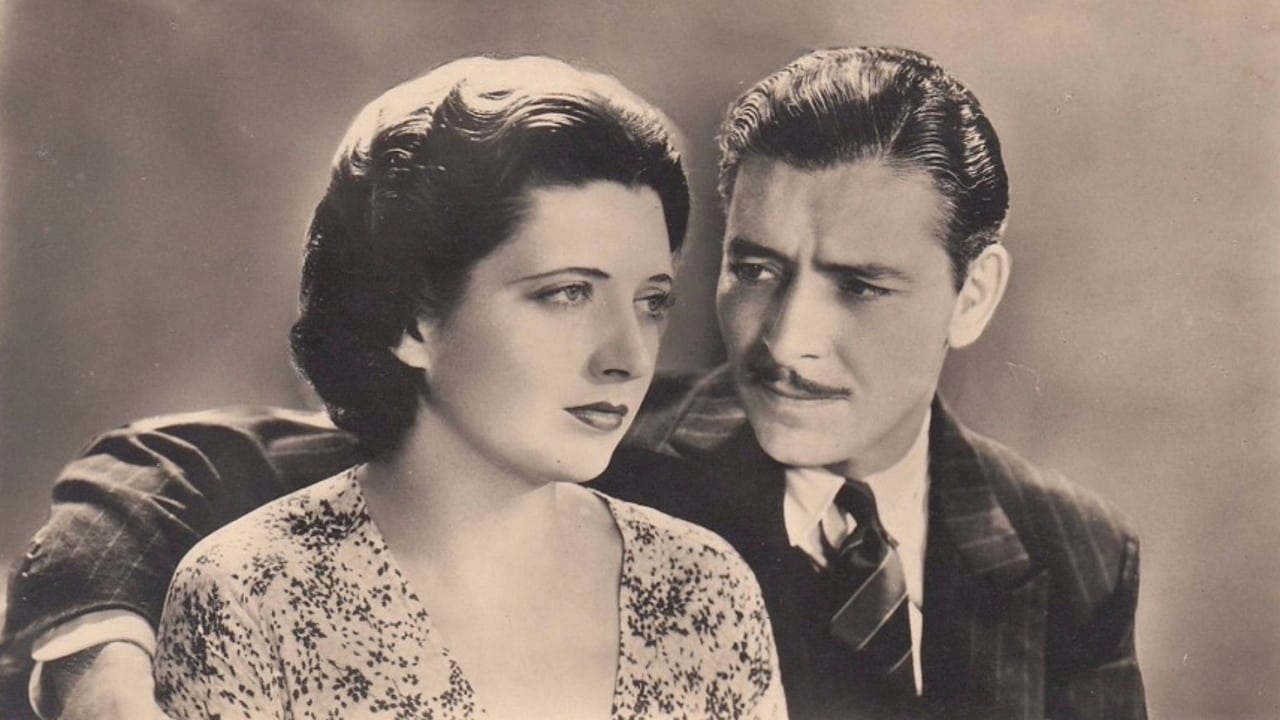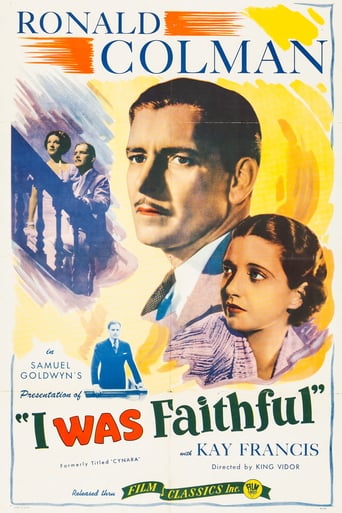


Please don't spend money on this.
... View Morei know i wasted 90 mins of my life.
... View MoreDon't listen to the negative reviews
... View MoreOne of the best movies of the year! Incredible from the beginning to the end.
... View More"Women marry men they hope they can change, and men marry women whom they hope will never change". So says the wise, aging scoundrel played by Henry Stephenson, giving a terrific performance in this lavish looking Goldwyn film that features a story similar to Selznick's 1939 classic "Intermezzo", that of a decent man (Ronald Colman) who finds himself involved with another woman while married to a wonderful woman and separated from her. The separation comes because of the wife's (Kay Francis) silly younger sister (Florine McKinney), escorting her to Italy on a whim on the day before Colman and Francis's seventh anniversary. Stephenson takes Colman out to dinner where they meet two young women (Phyllis Barry and Viva Tattersall) and spend a night out on the town with them. Barry falls head over heels in love with Colman who warns her about his situation, but she cannot allow herself to go. Unlike Ingrid Bergman in "Intermezzo", Barry is emotionally immature, even if she's not an outwardly silly creature like McKinney, and the story indicates that nothing inappropriate occurs during the times Colman and Barry are together.As he would do in his string of independent films of the 1930's, Samuel Goldwyn (along with director King Vidor and their artistic team) creates a very lavish fantasy like setting, with sensational glamorous restaurants, beautiful parks with lush greenery and art decco houses and other locales. From the reviews I've read, this has been referred to as being greatly dated, but the only thing I find perhaps dated about it is the fact that all three people involved in the situation are incredibly nice, although Barry's final act shows her to be an already troubled girl who needed more maturing before entering into any kind of serious relationship regardless of the other person's marital status. Francis gives her usual professional performance, noble yet not long-suffering, understanding yet not shocked when the revelations come out. Stephenson's character reminds me of the lovable old coots that Charles Coburn would later become famous for, and he steals every scene he is in with wit, wisdom and a touch of an "I've been there, done that...several times" attitude. As for Barry, she instills her young character with a love of life in the zest of youth that is hiding an inner sadness, indicating that past affairs have not been fulfilling and that she's either doomed to end up alone...or simply just doomed. A surprising climax has the previously vivacious Tattersall confronting Colman over an acting towards Barry, showing a great loyalty and moral code that you didn't expect to come from her. While looking at gossip column reports on affairs today, this might seem a bit unrealistic, but this is a view of a different kind of affair, one where the outcome is about companionship and the avoidance of loneliness rather than one of strictly sexual pleasure. Today's audiences might laugh at such an operatic view of old school scandals, but there are many lessons here to be learned, from the art of personal grace to the meaning of what true love really is, and ultimately, what keeps a marriage together even beyond the worst of situations.
... View MoreSad pre-Code film about adultery and its effects on the people involved has Ronald Colman starring as a British barrister happily married to Kay Francis. She goes off to Italy to save her silly sister from getting involved with the wrong man. Ironically, that leaves Colman easy prey for a conniving shop girl (Phyllis Barry) he meets by chance.Although she knows he's married and nothing can come of their affair, she relentlessly pursues him and he falls for her. She loses her job and becomes totally dependent on him. He tries to break if off just as Francis returns from Italy but with tragic results.Colman is excellent as the intelligent man who falls prey to temptation. Francis is wonderful as the wounded wife, and Barry is good as the conniving Doris. Co-stars include Henry Stephenson as the randy friend who starts all the trouble, Florine McKinney as Garla the silly sister, Viva Tattersall as Millie, Paul Porcasi as the restaurant owner, Halliwell Hobbes as the official, and Elspeth Dudgeon as Mrs. Weeks.There's also a clip from a Charlie Chaplin movie.
... View MoreFrom the part where Henry Stepehnson's character says "Women hope marriage will change a man, men hope it won't, both are disappointed" to the inquest scene, this is a pre-coderthis is a pre-coder with some good insights into the marriage game. The inquest scene I found rather over the top. If it was to be done, it should of been done as a dream sequence. Ronald Colman would of been ruined anyhow, due to his indiscretion. At the final scene, right before the re-emergence of Henry Stephenson, when it seems assured Ronald Colman, will leave, in disgrace, alone, my wife, yelled involuntarily at Kay Francis, "you fool".We watched this because I am a devout Kay Francis fan who is humoured. Though this really wasn't a real Kay movie, except for the suffering, it is well worth your time, keeping in mind that it has the virtues and warts of that time.Lastly, a movie inspired by one line of a Poem?
... View MoreRecently I was finally able to see this early sound classic with Ronald Colman and Kay Francis. I haven't seen many movies with the latter, and her understated beauty suits Colman perfectly.Colman looking elegant in his perfectly tailored suits, plays a conservative and happily married (to Kay, as Clemency) barrister whose life is turned upside down by a chance affair with a shop girl played sensitively by an unknown at the time, Phyllis Barry. King Vidor, the director, took a chance in casting her, but his faith in her ability paid off. She brings just the right touch of pathos and desperation to the role of Doris. (And just happens to resemble Kay more than just a little.) In David Shepard's book on King Vidor several effects within the movie are discussed, such as the movie within a movie scene with Charlie playing the little tramp when they all go to the flickers the night he and Tring (character actor Henry Stephenson in a salty role.) meet the girls, and the fade out scenes of Colman tearing up the paper with the girls address to a scene of Clemency in Venice with her sister and the scraps of paper have dissolved into pigeons in flight.I would say that this was a different type of role for Colman. Yet even though he plays an adulterous husband, his kindness and tenderness toward Doris is always there, and all parties suffer because of the infidelity. Even in a precode, no one gets away from the consequences of their actions! I highly recommend this movie for Colman and Francis fans and as a fine example of an early Vidor sound movie. I enjoyed it more than Street Scene as the sound quality was better by this time, and the story flowed more smoothly.
... View More